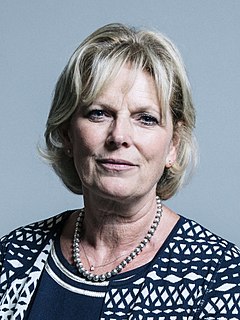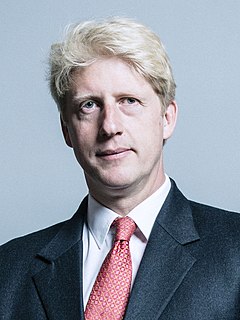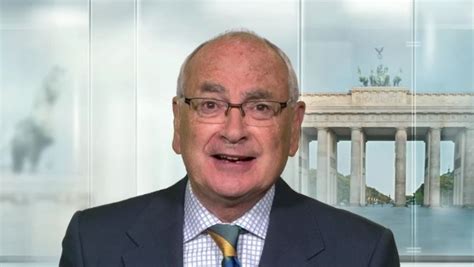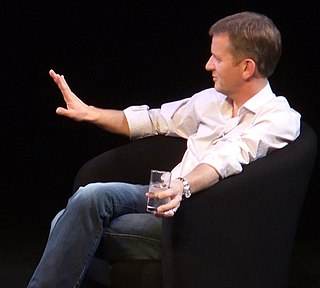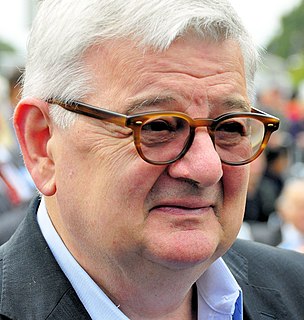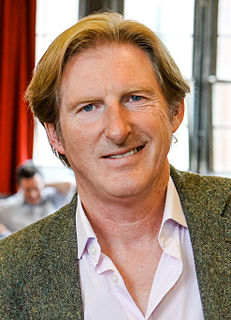Top 520 Brexit Quotes & Sayings - Page 9
Explore popular Brexit quotes.
Last updated on December 4, 2024.
Brexit for me was really interesting because I was in the heart of Yorkshire, which is a "leave" area. It was quite odd actually, a real deep sense of unease. You felt very odd for your country. You have lots of people that are angry. It's a very physical and public stand that these people are making.
We did it! Britain is no longer a member of the European Union. By 'we' I mean the 17.4 million Britons who voted Leave, Nigel Farage who fought for the cause for 25 years, Brexit Party MEPs, Tory Party members who were brave enough to desert their party in droves at the Euro-elections and, of course, the Daily Express.
I think Brexit's going to be a wonderful thing for Britain. I think when it irons out, you're gonna have your own identity and you're going to have the people that you want in your country and you're going to be able to make free trade deals without having somebody watching you and what you're doing.
What is true, and I think that we can't deny it, is that some of the same concerns about globalization, about technology, rapid social change that were reflected in Brexit, that's been reflected in some of the debates in Germany and France and other places, that those exist in the United States as well. My view is that over the long term, over the next 10, 15, 20 years, if we are able to address the legitimate economic concerns of those who feel left behind by globalization, then many of these tensions will be reduced. And we will see a world that is less divided.
Brexit was meant to be about taking back control, we are ceding control; it was meant to be about trade deals, we are not going to have any meaningful trade deals; it was meant to be about having a turbo-charged tiger economy on the edge of Europe, we are going to be bound by the common rule book that we won't have a hand in shaping.
Andrea Leadsom, I think, has all the qualities that you need at the moment. She's got a lot of zap, a lot of drive, and all the experience. Plus I think she can articulate what's needed at the moment, which is a bit of an antidote to some of the gloom and negativity and misunderstanding about what the Brexit vote means.
Political parties often take advantage of denial and fear in a moment of change. This is a well understood phenomenon that often leads to scapegoat-ism: blaming outsiders, such as immigrants, or racial and religious minorities. The phenomenon is behind Brexit and the violence in the political cycles in the US and EU.
I think that Europe has to get its act together very quickly. The Belgian guy who's leading the negotiations against Brexit, he sees it as a whole chance to reboot Europe and reclaim the kind of social mission of Europe from all this corporate, bureaucratic, globalist stuff that has got into, building Europe for the people rather than the banks, again.
If the widespread attempts to block Brexit gave us a glimpse into how fragile our commitment to democracy had become - reduced to a technocratic in-name-only veneer - reactions to Covid are a stark reminder that freedom cannot be assumed as a social norm that's deeply embedded into our institutions and our psyche.
I do not think the British want to become America's "Airstrip One," as the British Isles are called in George Orwell's "1984." The EU's internal market was a massive success even before the UK joined it, and it joined because there was no real alternative. So while British tabloids are expecting to be punished by Germany, Brexit is punishment in itself.
When historians get to write the truth about this completely unnecessary referendum [Brexit] they won't say it was a vote demanded by the British people to decide their national destiny. They will say it was the final battle in a decades-long Tory Civil War, at the heart of which was a fight to the death between two Old Etonians, David Cameron and Boris Johnson, for the hollow crown. A sort of Eton Wall Game. Where the poorest are put up against the wall and shot.
We are never going to get anywhere unless we have an open dialogue that allows people to speak. If we just go in with anger towards those who hold a different opinion, we won't ever get anywhere. Take Brexit - the notion that everyone who voted leave is racist is bullshit and I really hate that. Some of the most vulnerable people in our society have been targeted and they have been brainwashed and lied to. The last thing we should be doing is shouting at them, blaming them and calling them names.
It is my view that our response to the Brexit vote should not have been to turn in on ourselves. At a time of grave constitutional and economic challenge for our country, it was incumbent on us to rise to this threat and ensure that the Labour party should defend the interests of our communities and not allow the Tories a free hand.
I thought I'd left politics when Labour lost the 2010 election and I went off and ran a thinktank for two years and founded the National Infrastructure Commission. It was only because of Brexit that I came back. And I had to learn rapidly how to do politics in the 2010s and it soon became clear to me that you had to be ever-present on social media.
Because [Donald] Trump sticks to his script and was there to open his golf course, that's what he first began talking about. He didn't open with a statement on the Brexit vote. And so here comes the media - right on cue - and any allies they have, once again lashing out at Trump as incompetent, unaware, insensitive.
Trump has a clear goal: the division of Europe and the destruction of the European domestic market. The fact that Brexit propagandist Nigel Farage was the first European he received in his tower speaks volumes. That is why we must strengthen the European domestic market and work even more closely together in Europe. That is absolutely compulsory for Germany.
I think the first what would happen in the immediate wake of a hard Brexit is a lack of confidence in UK economy. Business is already telling me that they need a year or so to adjust to what is going to change in March 2019. Without a deal, tariffs would immediately kick in and we would need all the physical attributes of a customs border. And that is just the trade aspect. Imagine what would happen if, from one day to the next, we had no aviation agreement or no agreements for dealing with security across Europe.
I think the twenty-first century happened, basically. That this century started on 9/11. And basically, it's been a century of counter reaction to globalization and the meritocracy. And a good century for 72 nations have gotten more authoritarian. We've had Brexit. We have Le Pen rising in France. We've just got a lot of these types all around the world. And the people who are suffering from globalization and the meritocracy are saying, "No more. You know, we get a voice too."
On Brexit, the Conservatives are divided, not only about the tactics but also about the end goal. Some of them deeply and profoundly believe ideologically in a deregulated, low-tax, free-market economy. Others still favor the economic and political model that we operated with in Europe over many decades. The Labour party is united in what we are trying to achieve.
The silver lining of Brexit and Trump is that it has undermined the perception that globalization is an unstoppable force, whether or not we think it is a good thing or a bad thing. There have always been losers and as well as winners in this process, and cultural minorities have been among the most vulnerable losers. Now that sizable numbers of people in the most advanced economies have made their grievances felt in a fashion that is hard to ignore.
I thought Donald Trump approach on Brexit was a fascinating window into how he thinks.
His basic point was that [David] Cameron should resign because he didn't read the public mood on the issue right. And that Boris Johnson should be the next prime minister because he did. That's a very different definition of leadership than many politicians have. Or at least say they have.
What is the appeal of Trump, really? It's nostalgic: "Make America great again." Like European nationalists, he has a vision of a "real" America, one which predates globalization, immigration, feminism, the civil rights movement and technological change, an imaginary 1950s to which we can now return. That is actually not very different from the kind of language that Marine Le Pen uses, or parts of the Brexit movement.
The U.K. voted for Brexit and a lot of weak-willed, lily-livered people will say 'yeah but the people did not know what they were voting for, they had no idea of what this was going to entail.' Those are the people who are saying 'lets get a second referendum, let's make the people aware this time that there is, in fact, a lot more to this.'
A lot of things, whether it's Brexit, the U.S. election, things that are happening on Facebook Live, the way that Twitter in many cases was weaponized, obviously for good but then obviously for bad, for proxy. Governments who use it to troll and give voice to conspiracy theories, white supremacists, et cetera. I think that's not going away.
It would be a mistake to overstate the similarities between the Brexit vote and Trump's win - but there are common themes, not least in the rallying cries that the winning campaigns used. They focused on a supposed economic threat posed by outsiders, as immigrants or as trade partners. This fuelling of anxieties underpinned a narrative centered on the need to "regain control," whether of borders or of economic forces.
There may be some who wish that he would have taken the occasion to first comment on the Brexit vote, but they're not going to abandon him. They're not gonna let the media do it. Romney people? The media could separate his supporters from him, but they can't from Trump. They don't understand this yet. They think one of these times when they do a trick like this it's gonna work and they're gonna be able to really harm [Donald] Trump.
I think the Brexit vote in Great Britain informing this populist movement of nationalism is kind of a global thing, and I think it's no particular political party's fault. People have been left behind, and in America, we're used to going forward. It's always like we're going to be better; the next generation's going to be better.
With the arrival of the refugees in 2015, it became impossible to ignore that the period of uninterrupted sunshine that Germany had enjoyed had come to an end. The vast problems of the 21st century are knocking on our door. That is also true of the dramatic changes that we can see globally, for example with Brexit and the election of Donald Trump. You can't win people over by saying nothing and biding your time, as Angela Merkel has tried to do. People want leadership - in the best sense of the term.
The Donald Trump phenomenon in the U.S. is mirrored completely by the Brexit phenomenon in the U.K. It's very similar forces. And what is interesting to me is there are two different groups that come together, who don't really agree with each other, but have come together in unity against, if you like, what is perceived as the status quo, or - and certainly what is a more center-right or center-left type of politics.


